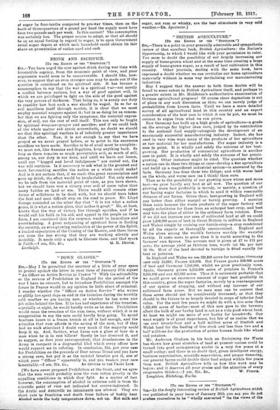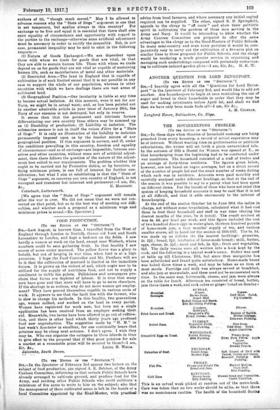[To ens EDITOR or " SPECTATOR.") •
Sut,—In the deeply interesting review of British A griculture which you' published in year issue of January 20th you say you do not Profess yourselves to be " wholly converted " (to the views of the
authors of it), " though much moved." May I be allowed to advance reasons why the " State of Siege " argument is one that is not temporary, but applies always to this country? For exchange to be free and equal it is essential that there shall also exist equality of circumstance and opportunity with regard to the parties to the exchange—otherwise some artificial adjustment must be necessary in order to rectify the inequality. But, in our case, permanent inequality may be said to exist in the following respects :- (1) Nature of Goods Exchanged.—We are dependent upon those with whom we trade for goods that are vital, in that they are able to sustain human life. Those with whom we trade depend on us for goods that are not vital or capable of sustaining human life, such as manufactures of metal and other materials.
(2) Restricted Area.—The land in England that is capable of cultivation is of such limited extent that it is not possible in any case to support the whole of our population, whereas in other countries with which we have dealings there are vast areas of cultivated land.
(3) Geographical Position.—Our insularity is liable at any time to become actual isolation. At this moment, were it not for our Navy, we might be in actual want; and, as has been pointed out in another admirable article in your issue of January 20th. the Navy of our enemies is not destroyed, but only in reserve.
It seems then that the permanent and intrinsic factors
differentiating our own country from others may be summed up as (1) Disability of production; (2) Liability to isolation. The submarine menace is not in itself the raison d'être for a " State of Siege." It is only an illustration of the liability to isolation permanently imposed upon us by the insular nature of our geographical position. If this argument is correct, and if, under the conditions prevailing in this country, freedom and equality of circumstance—and so of exchange—are impossible, between our- selves and other countries, without some sort of artificial adj ust- ment, then there follows the question of the nature of the adjust- ment beet suited to our requirements. The problem whether this ought to be carried out by Protective duties, or by bounties, or fixing minimum prices, is one full of interest for further con- sideration; but what I aim at establishing is that the " State of Siege " argument, as concerns our own country of England, is not emergent and transient but inherent and pormanent.—I am, Sir,
Cotesbach, Lutterteorth. C. MARRIOTT.
[We agree that the " State of Siege " argument will remain
after the war is fever. We did not mean that we were not con- verted on that point, but as to the best way of meeting our diffi- culties, and whether such a proposal as a minimum wage and minimum prices is sound.—En. Spectator.]



































 Previous page
Previous page